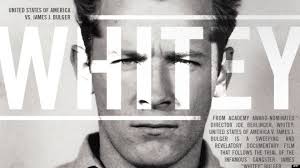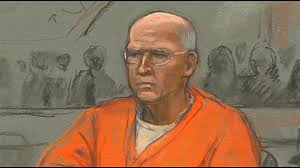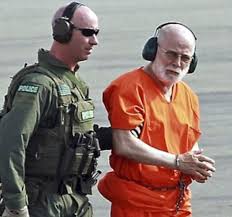His name was once second on the FBI’s Most Wanted list, right after that of Osama bin Laden. But even with notorious gangster Whitey Bulger captured, convicted and behind bars for the rest of his life in a federal penitentiary, the families of those he mercilessly killed are not convinced that justice was done.
Every aspect of Bulger’s life is over-the-top dramatic, from his beginnings as a young thug in South Boston, to a stint at Alcatraz for bank robbery, to his decades-long reign of murder, extortion, racketeering and drug dealing as leader of Boston’s infamous Winter Hill Gang, to his capture by the FBI after living an apparently ordinary life in Santa Monica, Calif. with his decades-younger girlfriend, Catherine Greig.
Inside the rent-controlled apartment, where the couple had lived under the names Charlie and Carol Gasko, authorities found $822,000 in cash and 30 weapons hidden in the walls.
Bulger had been on the lam for more than 16 years, fleeing Boston on the eve of an indictment after being tipped off by an FBI agent he had apparently bought off.
The circumstances were so dramatic that Bulger’s 30 years as an organized crime kingpin were the inspiration for Jack Nicholson’s character in the 2006 Oscar-winning film “The Departed.” In another star turn, Bulger will be portrayed by Johnny Depp in a Warner Bros. film called “Black Mass” scheduled for release next September. Boston natives Ben Affleck and Matt Damon are also reportedly developing a feature film.
But it is the real-life drama of what transpired after Bulger’s takedown in June 2011 that runs through the new documentary, “Whitey: United States of America v. James J. Bulger,” from CNN Films, directed by Joe Berlinger and produced by Berlinger and Caroline Suh.
It chronicles the sensational 2013 trial in Boston federal court in which Bulger stood accused of 19 murders and 32 counts of racketeering, money laundering, extortion, narcotics distribution and weapons charges.
Berlinger was in the courtroom for what promised to be the most explosive Boston trial since the Sacco-Vanzetti armed robbery murder case in 1920.
“It was an amazing experience, 30 years of history converging,” Berlinger said in a phone interview. “A lot of observers were disappointed that there was not a deeper inquiry into what made Bulger possible. It was a foregone conclusion on guilt, but my overwhelming feeling was that to go through the trouble and expense of trying an 83- year old, there should have been a fuller, deeper probe into corruption. The families deserve to know why he wasn’t taken off streets earlier. It made me realize not to do a bio of him, but to raise questions of corruption in law enforcement that enabled him.”
As the film opens, we hear a Boston liquor store owner describe the violent extortion Bulger visited upon him and his family, coming to his door and threatening to take control of his business and kill his children.
Bulger operated in Boston’s criminal underworld for three decades without encountering even a single indictment or misdemeanor prosecution, a crime lord who until his arrest and transfer back to his hometown had not seen the inside of a prison cell since 1956.
“Bulgerʼs story represented to me a nexus of the two major thematic threads that have dominated my documentary filmmaking endeavors – true crime and institutional corruption,” Berlinger said. “As a storyteller, I was also fascinated by the uniquely mythic status that Bulger has obtained in the public consciousness. Despite being accused of pathological brutality, he was also celebrated by many as a folk hero – a ‘good’ bad-guy. A Robin Hood of sorts, helping the poor and elderly and keeping his Boston neighborhood of Southie clean of drugs –myths that would later be debunked in the trial that is the subject of this film.”
One of the most remarked upon elements of the film, which premiered at the Sundance Film Festival and was released theatrically earlier this year, is that the audience gets to hear Bulger’s voice for the first time.
It happens in a phone call to his defense attorney, who allowed Berlinger’s crew to tape the conversation, the notorious gangster’s first-ever media interview. In the time between the verdict and his sentencing, Bulger discusses his relationship with investigators, his negotiations with prosecutors and his proposal to plead guilty in exchange for absolving his girlfriend of any charges—and he professes his love for her.
“The goal of including Bulger in the film was not to take sides or to diminish his crimes. Generally, we have never heard his point of view. Now that he’s in the custody of the federal government, no one will have access to him,” said Berlinger. “Bulger is a brutal killer and deserves to be behind bars. However, the families of the victims deserve to hear why Bulger was allowed to kill with impunity.”
The general consensus was that Bulger was an informant for the FBI, instrumental in helping the G-men take down leaders of the Italian Mafia in Boston, all the while being allowed to freely operate his criminal enterprises and murder at will. Yet Bulger claims he was never an informant and that law enforcement– Massachusetts State police, Boston police, the ATF and the FBI gave him information in exchange for money.
“I took care of everyone, in cash, $25-$50,000,” he said in the taped interview, and claimed he had a deal of immunity with the U.S. Attorney’s office because he protected a key official from Mafia retribution.
That viewpoint was never allowed to be presented in court – the judge nixed it before the trial began, thus Berlinger said, cheating the citizens of Massachusetts out of an opportunity to hear the whole truth fully aired.
The documentary raises questions that are not definitively answered, like how Bulger could be an informant if he never got paid, and if he was, why was he allowed to kill instead of being targeted and prosecuted?
Part of the answer seems to lie in the law enforcement fixation on the Italian Mob while looking the other way at the Irish gangsters.
If it all unraveled, the government would lose all of its Mob convictions—upon which many careers were made– and be held liable.
“In Boston, the Mafia generally hired Bulger’s gang to do their assassinations. The defense maintained that Bulger made a deal in exchange for not being prosecuted,” Berlinger said. “That’s exactly the issue, the government picking winners and losers. They shouldn’t be in that business if someone is a killer. The importance of the Bulger saga is how he was aided and abetted by the very same institutions that finally brought him to justice as an 83-year-old man who lived his life to the fullest.”
“What makes this trial extraordinary – and really crazy – is the defense is defending him from an assertion that he was in an informant, even though it is not a charge,” said David Boeri, senior reporter for Boston’s WBUR radio, one of many Beantown journos who have been on the Bulger beat for years. “It’s not about guilt or innocence in this trial. It’s about his legacy, of wanting to establish that he wasn’t a tout, a rat, an informant.”
It should be noted that two of the three prosecutors in the case (Brian T. Kelly and Fred M. Wyshak, Jr.) worked for two decades to bring Bulger to justice, and Berlinger said they deserve tremendous credit for fighting against the institutional resistance that prevented this indictment from moving forward in the early years of Bulger’s reign.
“In many ways, they are heroes,” he said. “But the prosecution in this trial also seemed to be simultaneously turning a blind eye to the deeper and troubling questions that have yet to be answered about the nature and extent of the government corruption that may have surrounded this case.”
Bulger did not take the stand in his own defense and later called the entire trial a sham.
For Berlinger, the most searing memory of the trial was the fact that the victims’ families took the side of the defense and not the prosecution. “They were angry that the prosecution was limiting the scope of the trial and therefore rooting for the very guy who killed their loved ones.”
(“Whitey: United States of America v. James J. Bulger,” premiered on CNN September 18 and will encore Saturday, September 20 at 9 p.m. and 11 p.m ET.)
–Hillary Atkin




